Does New York City need another film festival? Apparently, yes. In less than 10 years, the all-documentary film series DOC NYC has made its mark, filling the gap in the calendar until the typically documentary-rich Tribeca Film Festival unspools in the spring. This year, DOC NYC boasts more than 80 feature films covering a huge range of subject matter as well as dozens of world premieres, a sign of the varied and plentiful output of films available to programmers. It also includes screenings of some of the best non-fiction films this year, including Minding the Gap, Shirkers, and perhaps the most suspenseful film of the year, Free Solo. The festival has also scored a coup in the world premiere of the long-awaited Aretha Franklin concert film Amazing Grace from 1972, now freed from years of legal wrangling. Below is just a sliver of the selections that loosely focus on the performing arts.
What She Said: The Art of Pauline Kael
Pauline Kael gets her close-up in Rob Garver’s debut documentary, a selection that’s a no-brainer for film buffs. It’s a candid and lively overview of her career as a film critic, both at The New Yorker, where her tenure began alongside the rise of New Hollywood, and earlier in the Bay Area, working for little or no pay while raising a child on her own during the 1940s and ’50s.
All of her greatest hits make appearances, such as her review that resurrected Bonnie and Clyde from the critical trash heap; her hyperbolic praise for Bernardo Bertolucci’s Last Tango in Paris, which now, in the light of the Me Too movement 45 years later, hasn’t aged well; and her early support for Martin Scorsese and Brian De Palma. (Yet despite her best of efforts, De Palma’s Casualties of War has not joined the ranks of modern masterpieces.) She’s perhaps most famous for smackdowns, including her stance against the popularity of The Sound of Music—among her criticisms, she called Julie Andrews “sexless”—and her attacks on the auteur theory as championed by the Village Voice’s Andrew Sarris.
Through sound bites of her reviews, voiced by Sarah Jessica Parker, her writing still packs a punch and is as conversational as ever. Although there are a lot of talking heads praising her work and impact, they are fortunately upstaged by abundant film clips. Though the emphasis is on her work, What She Said is also a portrait of Kael as a contradictory curmudgeon—most likely, they go hand in hand. She famously belittled the work of director David Lean, who has said he stopped making films for more than 10 years after their withering encounter at a luncheon. (Viewers are left wondering what exactly she said.) Sarris’s widow, critic Molly Haskell, also feels Kael opposed Sarris’s directorial theory “in a very personal and almost slanderous way.” She was “cruel for no reason,” according to the Wall Street Journal’s Joe Morgenstern, and “mean-spirited,” per director Peter Bogdanovich. Yet according to Kael’s daughter, Gina James, Kael took a hit herself in Renata Alder’s scathing examination of the critic’s writing in The New York Review of Books, where Adler describes Kael’s collection When the Lights Go Down as “line by line, and without interruption, worthless.” Ah, the days of film criticism as a blood sport.
Though the filmmaking is conventional, the subject matter most certainly is not.
What She Said screens November 11.
Dennis and Lois
Chris Cassidy’s laidback film might be the sleeper discovery of the documentary series. The graying titular couple, both approaching their 70s, stick out at practically every rock concert they attend, often mistaken for the grandparents of someone in the band. Though they have day jobs, they are mainly superfans who travel the country and are often on the road for weeks at a time or on a plane to catch a concert in Manchester before coming back on the next day. (The northern English city is their spiritual home, where they would like their ashes to be scattered.) Fans of BBC Radio 6 will be familiar with their favorite groups: the Mekons, the Vaccines, Elbow, and John Grant, to name a few. As they say in their relaxed and low-key interviews, they wanted this life. They estimate they have been to at least 10,000 shows.
Both they and rock ‘n’ roll came of age together. As a teen, Lois would leave her Flatbush neighborhood and go to the Brooklyn’s Paramount Theater, where she saw the Beatles, the Rolling Stones, and James Brown. The couple met at CBGB’s during a Ramones concert in the mid-1970s, and early on in their relationship they became friends with their favorite bands. Among the many relics in their home is a pair of shredded jeans worn by Joey Ramone. They even saved the bottles that band members drank from and a towel used by the Clash’s Joe Strummer.
This is an unusually sincere and wholesome rock ‘n’ roll documentary, with scant anecdotes about bad or substance-fueled behavior, although as a favor, Dennis once FedEx’d weed to the Happy Mondays in the early ’90s. However, the film doesn’t go into great detail about how they support their concert-going habit, though presumably they own a duplex because they mention having two tenants. The only problems posing as a looming buzz kill are Lois’s health issues: she needs assistance walking, which prevents her from going out to clubs several times a week, but her health doesn’t prevent her entirely from doing what she loves.
Dennis and Lois screens Wednesday, November 14 and Thursday, November 15.
Creating a Character: The Moni Yakim Legacy
Filmmaker Rauzar Alexander has made one of the more insightful films about acting in some time, an observational tribute to acting teacher Moni Yakim. It’s almost like auditing a class. The film is part bio, part how-to, albeit a vicarious one. Through the young participating actors in Yakim’s Juilliard class, viewers get the chance to writhe on the floor, talk in gibberish, and move about without restraint.
Yakim is the one founding member of Juilliard’s acting program remaining from 1970. In his movement classes, he teaches actors how to express themselves physically to form a character. One of his students is actor Alex Sharp, whom the film follows year-to-year under Yakim’s guidance. The film almost becomes a promo for the school as Sharp is eventually cast in a physically demanding lead role in a Broadway play before he has graduated: The Curious Incident of the Dog in the Night-Time, for which he will win a Best Actor Tony. Executive producers Jessica Chastain and Anthony Mackie join their fellow Julliard alumni Laura Linney and Kevin Kline in praising their former teacher’s influence on their work.
Two of Yakim’s mentors, mime artist Marcel Marceau and acting teaching Stella Adler, make important appearances early in his career and onscreen here, marking the first time the two have ever been together on stage or film. (Adler disliked mime, believing its practitioners didn’t go deep enough emotionally.) And what Yakim has to say about theater also holds true with movies, “If theater is not full of surprises, it’s not interesting.”
Creating a Character screens Sunday, November 11.
Teddy Pendergrass: If You Don’t Know Me
Has the 1985 Live Aid concert knocked Woodstock off its pedestal as the most seminal rock event of all time? The recent biopic of Queen front man Freddie Mercury, Bohemian Rhapsody, climaxes with a nearly 20-minute reenactment of their set at the fund-raising concert. Live Aid was also the platform for the comeback of singer Teddy Pendergrass, three years after an auto accident left him a quadriplegic.
The life of Philadelphia-born R&B singer, sex symbol, and ordained minister Pendergrass has all of the rise-and-fall drama of a feature film—it’s surprising one hasn’t been made yet. Raised by a single mother in a tough North Philly neighborhood, he rose to prominence as one of the singers of Harold Melvin & the Blue Notes (“If You Don’t Know Me by Now” and “Wake Up Everybody,” among their many hits), but he was actually writing and singing most of the hit songs, and he thrived as a solo artist after the group broke up, before the 1982 car accident that left him paralyzed.
Besides having the makings of an aspirational biopic, there is also the undercurrent of a crime story as his first manager, Taaz Lang, who was also his girlfriend at the time, was shot and killed—a murder that has never been solved. Many of the interviewees spread allegations that the “black Mafia” may have been behind the murder and that they were in the background during Pendergrass’s early days as a solo artist.
Produced by the BBC Storyville documentary series, director Olivia Lichtenstein tells his bio straightforwardly, though with an occasional reenactment. Her film benefits greatly from the participation of the singer’s mother, Ida, who is now 100-years-old, and his former dancers, backup singers, and colleagues, all of whom speak admiringly of Pendergrass. This film also shines on a spotlight on the Philadelphia sound, which has often been overshadowed by the Motown sound and the rise of disco.
Teddy Pendergrass screens Friday, November 9.

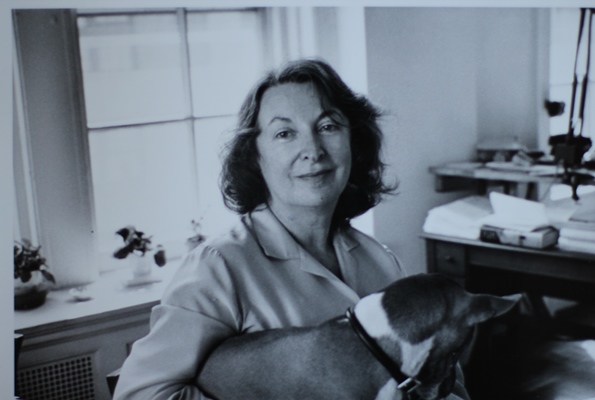
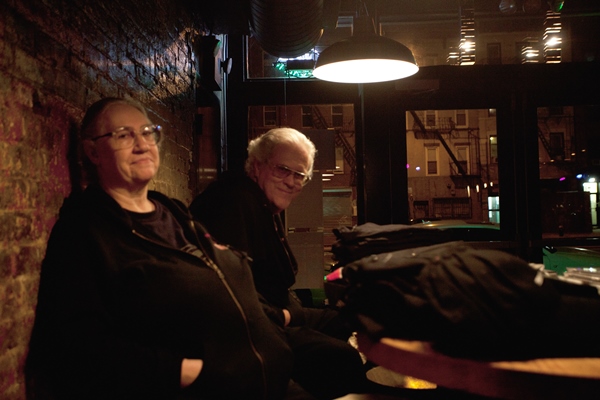
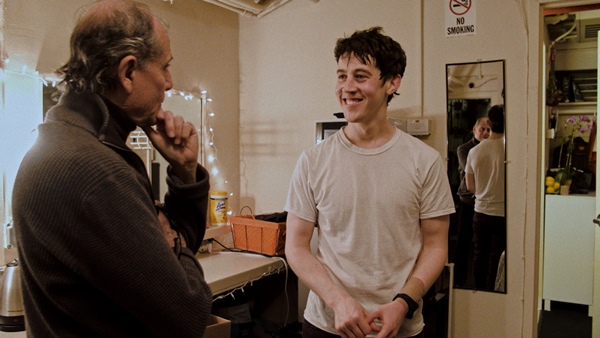




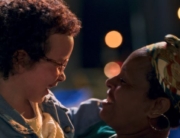
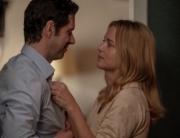
“Casualties of War” is certainly in MY ranks of modern masterpieces.